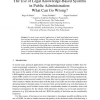Free Online Productivity Tools
i2Speak
i2Symbol
i2OCR
iTex2Img
iWeb2Print
iWeb2Shot
i2Type
iPdf2Split
iPdf2Merge
i2Bopomofo
i2Arabic
i2Style
i2Image
i2PDF
iLatex2Rtf
Sci2ools
ICAIL
2003
ACM
2003
ACM
The use of legal knowledge-based systems in public administration: what can go wrong?
In recent years, practical applications of legal knowledge-based systems have become increasingly common. This raises the issue of their functioning in practice and their actual influence on the quality of decisions. In this paper we investigate to what extent incorrect decisions may be caused by factors that cannot be attributed to flaws in the programme’s knowledge base or reasoning. Based on a literature study, five possible causes are identified that pertain to the interaction between a programme and its user. Then it is illustrated how this list of causes may be used to investigate risk factors in practical applications, with a small case study on the use of a knowledgebased system in processing claims for general income support in a Dutch municipality.
| Added | 05 Jul 2010 |
| Updated | 05 Jul 2010 |
| Type | Conference |
| Year | 2003 |
| Where | ICAIL |
| Authors | Hugo de Bruin, Henry Prakken, Jörgen S. Svensson |
Comments (0)

